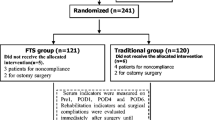Abstract
Purposes
The inflammatory response after surgery is associated with various postoperative complications. The aim of the present prospective study was to evaluate the effects of Daikenchuto (DKT) (a Japanese herbal medicine) on the inflammatory response in patients following laparoscopic colorectal resection.
Methods
Thirty patients who underwent laparoscopic colectomy for colorectal carcinoma were divided into two groups: a DKT intake group (D group, n = 15) and a control group (C group, n = 15). The D group took 7.5 g/day of DKT from the day after surgery until the 7th postoperative day. The body temperature, heart rate, WBC count, lymphocyte count, C-reactive protein (CRP) level, β-d-glucan level and Candida index were compared between the two groups.
Results
The patients’ mean age in the D group was significantly younger than that in the C group. D3 lymph node dissection was performed more often in the D group. The time until first flatus was significantly shorter in the D group (1.8 ± 0.5 days) than in the C group (2.7 ± 0.5 days). The CRP level was significantly lower in the D group (4.6 ± 0.6 mg/dl) than in the C group (8.3 ± 1.1 mg/dl) on the 3rd postoperative day.
Conclusions
Postoperative DKT administration significantly suppressed the CRP level and shortened the time until first flatus. DKT administration also significantly suppressed postoperative inflammation following surgery for colorectal cancer.


Similar content being viewed by others
References
Ekelund M, Ekelund M, Qader SS, Hallen MH, Ekblad E. Effects of total parenteral nutrition on rat enteric nervous system, intestinal morphology, and motility. J Surg Res. 2005;124:187–93.
MacFie J, Reddy BS, Gatt M, Jain PK, Sowdi R, Mitchell CJ. Bacterial translocation studied in 927 patients over 13 years. Brit J Surg. 2006;93:87–93.
Anderson ADG, McNaught CE, Jain PK, MacFie J. Randomised clinical trial of symbiotic therapy in elective surgical patients. Gut. 2004;53:241–5.
Sato Y, Inoue S, Katagiri F, Itoh H, Takeyama M. Effects of Pirenzepine on Daikenchuto-induced elevation of the plasma neuropeptide levels in humans. Biol Pharm Bull. 2006;29:166–71.
Satoh K, Kase Y, Yuzurihara M, Mizoguchi K, Kurauchi K, Ishige A. Effect of Daikenchuto (Da-Jian-Zhong-Tang) on the delayed intestinal propulsion induced by chlorpromazine in mice. J Ethnopharmacol. 2003;86:37–44.
Hashimoto K, Satoh K, Murata P, Makino B, Sakakibara I, Kase Y, et al. Components of Panax ginseng that improve accelerated small intestinal transit. J Ethnopharmacol. 2003;84:115–9.
Nakamura T, Sakai A, Isogami I, Noda K, Ueno K, Yano S. Abatement of morphine-induced slowing in gastrointestinal transit by Daikenchuto, a traditional Japanese herbal medicine. Jpn J Pharmacol. 2002;88:217–21.
Satoh K, Hashimoto K, Hayakawa T, Ishige A, Kaneko M, Ogihara S, et al. Mechanism of atropine-resistant contraction induced by Daikenchuto in guinea pig ileum. Jpn J Pharmacol. 2001;86:32–7.
Suehiro T, Matsumata G, Shikada Y, Sugimachi K. The effect of the herbal medicines Daikenchuto and Keishi-bukuryo-gan on bowel movement after colorectal surgery. Hepatogastroenterology. 2005;52:97–100.
Itoh T, Yamakawa J, Mai M, Yamaguchi N, Kanda T. The effect of the herbal medicine Daikenchuto on post-operative ileus. J Int Med Res. 2002;30:428–32.
Hayakawa T, Kase Y, Saito K, Hashimoto K, Ishige A, Komatsu Y, et al. Pharmacological studies of the effect of Daikenchuto on spontaneous contraction of isolated rabbit jejunum. J Smooth Muscle Res. 1999;35:55–62.
Murata P, Kase Y, Ishige A, Sasaki H, Kurosawa S, Nakamura T. The herbal medicine Daikenchuto and one of its active components 6-shogaol increase intestinal blood flow in rats. Life Sci. 2002;70:2061–70.
Kaiho T, Tanaka T, Tsuchiya S, Yanagisawa S, Takeuchi O, Miura M, et al. Effect of the herbal medicine Daikenchuto for serum ammonia in hepatectomized patient. Hepatogastroenterology. 2004;52:161–5.
Hayakawa T, Kase Y, Saito K, Kashimoto K, Ishige A, Komatsu Y, et al. Effect of Daikenchuto on intestinal obstruction following laparotomy. J Smooth Muscle Res. 1999;35:47–54.
Yoshiakwa K, Kurita N, Higashijima J, Miyamoto T, Miyamoto H, Nishioka M, et al. Kampo medicine “Daikenchuto” prevents bacterial translocation in rats. Dig Dis Sci. 2008;53:1824–31.
Ohya T, Usui Y, Arii S, Iwai T. Effect of Daikenchuto on obstructive bowel disease in children. Am J Chin Med. 2003;31:129–35.
Jin X, Shibata C, Naito H, Ueno T, Funayama Y, Fukushima K, et al. Intraduodenal and intrajejunal administration of the herbal medicine, Daikenchutou, stimulates small intestinal motility via cholinergic receptors in conscious dogs. Dig Dis Sci. 2001;46:1171–6.
Satoh K, Hayakawa T, Kase Y, Ishige A, Sasaki H, Nishikawa S, et al. Mechanisms for contractile effect of Daikenchuto in isolated guinea pig ileum. Dig Dis Sci. 2001;46:250–6.
Shibata C, Sasaki I, Naito H, Ueno T, Matsumo S. The herbal medicine Daikenchutou stimulates upper gut motility through cholinergic and 5-hydroxytryptamine 3 receptors in conscious dogs. Surgery. 1999;126:918–24.
Warner BW. Enterocyte apoptosis and TPN-associated intestinal mucosal atrophy: a view of the chicken or the egg? Gastroenterology. 2003;125:1273–4.
Veal N, Auduberteau H, Lemarie C, Oberti F, Cales P. Effect of octreotide on intestinal transit and bacterial translocation in conscious rats with portal hypertension and liver fibrosis. Dig Dis Sci. 2001;46:2367–73.
Conflict of interest
Drs. Kozo Yoshikawa, Mitsuo Shimada, Masanori Nishioka, Nobuhiro Kurita, Takashi Iwata, Jun Higashijima, Tomohiko Miyatani, Motoya Chikakiyo, Toshihiro Nakao, and Masato Komatsu have no conflicts of interest or financial ties to disclose.
Author information
Authors and Affiliations
Corresponding author
Rights and permissions
About this article
Cite this article
Yoshikawa, K., Shimada, M., Nishioka, M. et al. The effects of the Kampo medicine (Japanese herbal medicine) “Daikenchuto” on the surgical inflammatory response following laparoscopic colorectal resection. Surg Today 42, 646–651 (2012). https://doi.org/10.1007/s00595-011-0094-4
Received:
Accepted:
Published:
Issue Date:
DOI: https://doi.org/10.1007/s00595-011-0094-4




